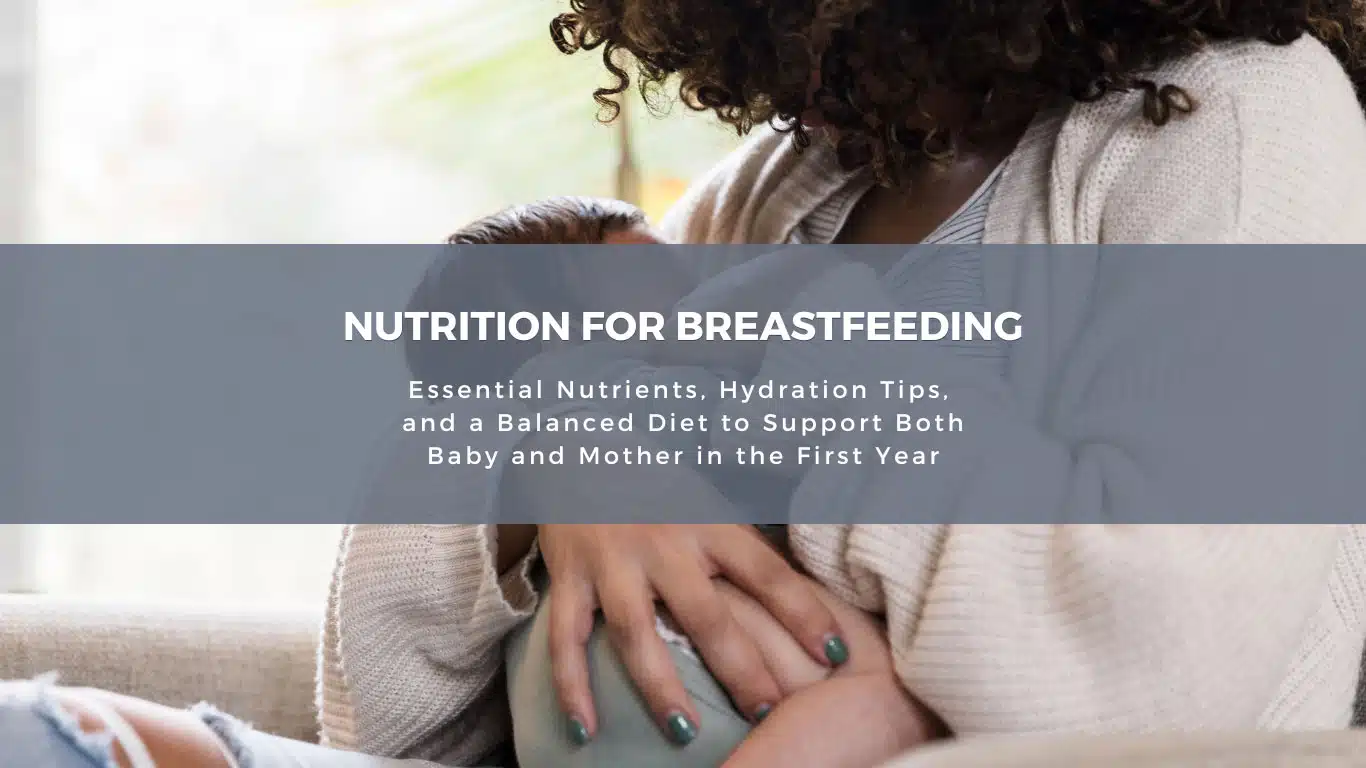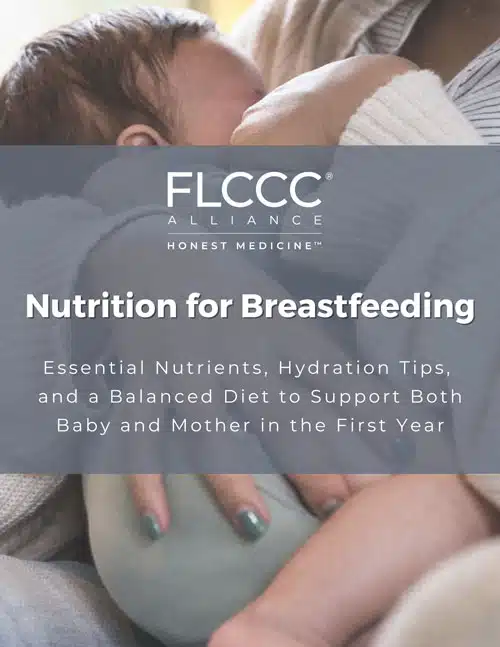Essential nutrition tips for breastfeeding women to boost milk supply and support baby’s growth. Learn what to eat, avoid, and stay energized!

Did you know that your nutrition while breastfeeding can significantly impact both your milk supply and your baby’s development? It might seem overwhelming, but understanding nutrition for breastfeeding is crucial for both you and your baby. Good nutrition supports your well-being and plays a vital role in providing the best milk for your baby.
Many breastfeeding mothers are unsure about what they should or shouldn’t eat while breastfeeding. This may be new territory – but you aren’t alone. It’s easy to have concerns about low milk supply or not know what to eat to help your baby. But don’t worry—we’re here to help!
FLCCC Senior Fellow Dr. Kristina Carman is back with another guide! This time she breaks down everything you need to know about nutrition during breastfeeding. We’ll explore essential nutrients, hydration tips, and practical advice to ensure you and your baby get the nourishment you need throughout your first year.
Understanding the Importance of Nutrition While You Breastfeed
Breastfeeding is more than just feeding your baby; it’s a process that supports physical growth, immune enhancement, and emotional connection. As a breastfeeding mother, your maternal diet directly influences the quality and quantity of your breast milk. It’s important to eat a balanced diet to ensure you’re providing all the nutrients your baby needs through breast milk.
Breastfeeding mothers need to consume about 300 to 500 extra calories per day compared to their pre-pregnancy intake. These extra calories help your body produce enough milk for your baby. Remember, your body needs extra energy and nutrition to produce milk, so it’s essential to eat enough.
Essential Nutrients for Breastfeeding Mothers
Maintaining a balanced diet while breastfeeding ensures that both you and your baby are getting the necessary nutrients. Here are some key nutrients to focus on:
Vitamins and Breastfeeding: What You Need to Know
- Vitamin A: Vital for your baby’s eye health and immune system. Include foods like sweet potatoes, carrots, and dark leafy greens.
- Vitamin D: Supports bone health for both you and your baby. While sunlight exposure helps, consider a vitamin supplement if needed.
- Vitamin B12: Essential for nerve function and found in animal products. If you follow a vegetarian or vegan diet, a multivitamin may be necessary.
- Prenatal Vitamin: Continuing your prenatal vitamin can help fill any nutritional gaps in your diet.
Calcium Intake for Milk Production
Calcium is crucial for your baby’s bone and teeth development and for maintaining your own bone health. Aim for two to three servings of calcium-rich foods per day, such as dairy products like cow’s milk, cheese, and yogurt, or fortified plant-based alternatives.
Fatty Acids
Essential fatty acids, especially DHA, are important for your baby’s brain and eye development. Include sources like fatty fish (eat fish like salmon and sardines), flaxseeds, and walnuts in your diet.
Iron
Iron is important for the formation of hemoglobin and helps prevent anemia. Include lean red meat, poultry, fish, beans, and lentils in your meals.

Hydration Tips for Breastfeeding Mothers
Staying hydrated is key during breastfeeding, as it supports optimal milk production. While exact fluid needs vary, a good general rule is to drink enough so that your urine is light-colored. Drinks are best when they are water, milk, or unsweetened beverages.
Foods and Drinks to Limit or Avoid While Breastfeeding
While most foods are safe to eat while breastfeeding, certain foods and drinks may affect your baby or your milk supply.
Caffeine and Alcohol: What You Should Know
- Caffeine: Moderate caffeine intake (up to two to three cups of coffee per day) is generally considered safe for a baby. Excessive caffeine can make your baby fussy or disrupt sleep. Be mindful of caffeine sources, including tea and soft drinks.
- Alcohol: Alcohol in breast milk can affect your baby. It’s best to avoid breastfeeding until alcohol is completely cleared from your breast milk. If you drink alcohol, wait at least two hours per drink before breastfeeding. Avoid breastfeeding during this time to ensure your baby isn’t consuming alcohol in breast milk.
Seafood and Mercury: Eating Fish Safely
Eating fish provides important nutrients like omega-3 fatty acids but be cautious of mercury levels in certain seafood. Limit or avoid high-mercury fish like shark, swordfish, and king mackerel. Opt for low-mercury options and eat fish that’s safe during breastfeeding.
Avoiding Certain Foods
Some babies may react to certain foods you eat. If you notice that specific foods make your baby fussy or cause allergic reactions, consider avoiding certain foods from your diet. Common culprits include dairy, soy, and nuts. Always consult your health care provider before eliminating foods from your diet.

Special Diets While You’re Breastfeeding
Vegetarian and Vegan Diets
If you follow a vegetarian or vegan diet while breastfeeding, it’s important to ensure you’re getting all the nutrients you and your baby need.
- Protein: Include plant-based proteins like beans, lentils, tofu, and nuts.
- Vitamin B12: Since B12 is primarily found in animal products, a supplement or fortified foods may be necessary.
- Iron and Zinc: Include sources like whole grains, legumes, and fortified cereals.
- Calcium and Vitamin D: Ensure adequate intake through fortified plant-based milks or supplements.
Consult your health care provider about taking a multivitamin to ensure you and your baby are getting all necessary nutrients.
Practical Nutrition Tips for Breastfeeding Mothers
- Eat a Variety of Foods: Consuming a variety of foods from all food groups ensures a balanced intake of nutrients.
- Eat Enough: Don’t try to lose pregnancy weight too quickly. You need to eat a little extra to maintain your milk supply.
- Stay Hydrated: Drink plenty of fluids throughout the day. Water is the best choice, but milk and herbal teas are also good options.
- Listen to Your Hunger and Thirst Cues: Your body will signal when you need to eat or drink more.
- Avoid Extreme Diets: Diet alone shouldn’t be used to lose weight rapidly while breastfeeding.
- Limit Processed Foods: Focus on whole, nutritious foods rather than processed snacks.
Understanding How Your Diet Affects Your Baby
The foods you eat can influence the taste of your breast milk, which might make your baby more willing to try solid foods down the road. However, some foods might make your baby fussy or cause allergic reactions. If you suspect certain foods are affecting your baby, consult your health care provider.

FAQs: Diet While Breastfeeding
What is the best nutrition for breastfeeding mothers?
A balanced diet rich in fruits, vegetables, whole grains, lean proteins, and healthy fats is best for breastfeeding mothers. Including a variety of foods ensures you get the extra calories and nutrients needed during breastfeeding.
What are the nutritional requirements for breastfeeding mothers?
Breastfeeding mothers need about 300 to 500 extra calories per day. Key nutrients include calcium, vitamin D, iron, and essential fatty acids. A multivitamin or prenatal vitamin may help cover any gaps.
What should a mother not eat when breastfeeding?
Generally, you don’t need to avoid specific foods unless they make your baby fussy or show signs of food allergies. Limit caffeine and alcohol, and be cautious with high-mercury seafood.
What nutrients do breastfed babies need?
Breastfed babies get most nutrients from breast milk, but they may need a vitamin D supplement. Consult your health care provider to ensure your baby is getting everything they need.
What is the most important nutrient in breast milk?
Breast milk contains many important nutrients, but essential fatty acids like DHA are crucial for brain and eye development.
Which supplement is best for breastfeeding mothers?
Continuing with a prenatal vitamin or taking a multivitamin can help fill nutritional gaps. Vitamin D and B12 supplements may be necessary, especially for those on a vegetarian or vegan diet.
Breastfeeding and Diet Go Hand in Hand
Nourishing your body is important for breastfeeding. By maintaining a balanced diet and being mindful of certain foods and drinks, you can ensure that you and your baby are getting the best nutrition possible. Remember, it’s important to eat well not just for your baby but for your own health too. If you have concerns, don’t hesitate to reach out to your health care provider for personalized advice.
More from Dr. Kristina Carman:




